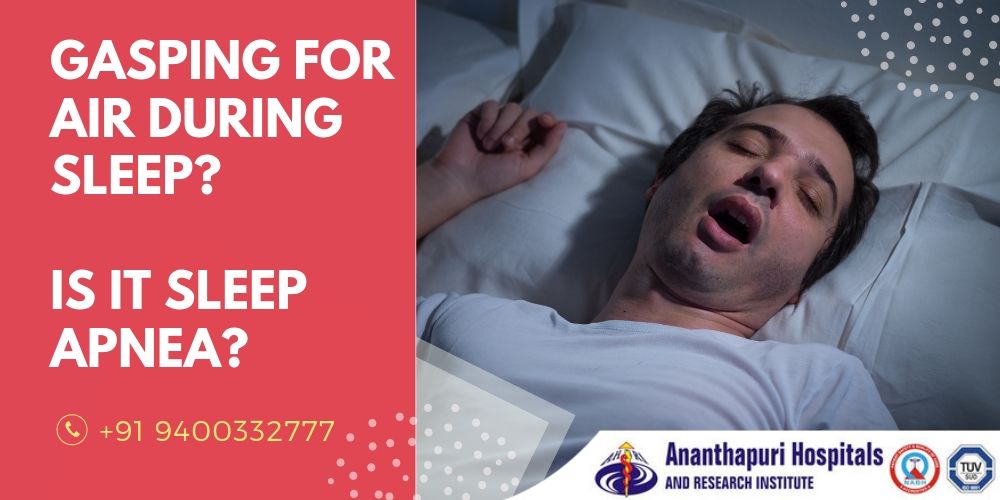- 06/September/2019

Sleep Apnea - Treatment, CPAP | Ananthapuri Hospitals, Trivandrum
A patient who visited a pulmonologist revealed that he was waking up in the night as a result of not being able to breathe properly during sleep. He also told the doctor that he snores, has early morning headache and he feels very tired throughout the day, even after a good night’s sleep.
Following a series of tests and evaluations, the doctor confirmed that the patient was suffering from a sleep disorder called SLEEP APNEA. After the diagnosis, the patient became more curious to know about the condition that he was suffering from.
Owing to his inquisitiveness, the doctor decided to enlighten him with a detailed explanation of this condition.
Here are a few questions that he asked the doctor -
-
What is sleep apnea?
The term ‘apnea’ refers to temporary discontinuance of breathing, especially during sleep. Sleep apnea is a serious sleep disorder in which you experience interrupted breathing patterns, causing you to wake up in order to start breathing again.
2. What are the main types and causes of sleep apnea?
The following are the three different types of sleep apnea and their causes:
- Obstructive sleep apnea: The most common form of sleep apnea which occurs when your soft tissue in the back of the throat relax and block your airway during sleep
- Central sleep apnea: A less common form of sleep apnea which occurs when your brain doesn't send proper signals to the muscles to breathe, due to instability in the respiratory control centre
- Complex sleep apnea: A distinct form of sleep apnea, which occurs when you have both obstructive sleep apnea and central sleep apnea
3. What are the warning signs and symptoms of sleep apnea?
Signs and symptoms vary for different individuals. The most common signs and symptoms include:
- Loud snoring during sleep
- Interrupted breathing pattern
- Gasping for air during sleep
- Awakening with a dry mouth and throat
- Morning headaches
- Excessive sleepiness and tiredness during the day
- Inattentiveness and forgetfulness
- Repeated awakenings leading to irritability
- Unexplained mood swings
- Reduced sexual drive and intimacy
4. Can sleep apnea kill you?
If left untreated, sleep apnea can lead to poor performance in everyday activities in children and adolescents. It can lead to depression, and can also increase the risk of heart diseases such as heart failure, heart attack, stroke and so on. In short, untreated sleep apnea can kill you!
5. Can you cure sleep apnea naturally?
Though it might not be possible to ‘cure’ sleep apnea other than by undergoing surgery, there are certain things you can do to reduce the symptoms. You may be able to treat mild cases of sleep apnea by changing your lifestyle, for example:
- Losing weight
- Reducing the consumption of alcohol
- Avoiding cigarette smoking
- Treat hypothyroidism (if present)
- Maintain good sleep hygiene
- a) Changing sleep positions to improve breathing
- b) Avoiding sleeping on your back
- c) Avoid screen time 1 hour prior to sleep
- d) Follow a particular sleeping pattern
6. What are the treatment options available for sleep apnea?
Sleep apnea treatments are individualised and vary from patient to patient. On a broad level, treatments may vary from making changes to your lifestyle, such as losing weight or changing sleep positions, undergoing Continuous Positive Airway Pressure (CPAP) therapy, to surgery.
Your doctor may perform certain tests to diagnose your condition. If it is a mild case, you may only need to make lifestyle changes. In more serious cases, the doctor may recommend Continuous Positive Airway Pressure (CPAP) treatment or dental devices to keep the airway open.
CPAP is a common treatment in which a mask is worn over the nose and/or mouth while you sleep, and dental devices are oral appliances that fit like an orthodontic retainer. In case you have a deviated nasal septum, enlarged tonsils, or a small lower jaw with an overbite, your doctor may recommend a suitable surgery.
----------------------------------------------------
If you experience a combination of the symptoms stated above, make sure you book an appointment and consult an ENT specialist. An ENT specialist can rule out the blockage in your nose or throat if you have obstructive sleep apnea. In case you need further evaluation, the doctor may refer you to a pulmonologist.
.
Department of ENT and Department of Pulmonology of Ananthapuri Hospitals have experienced medical professionals who are experts in managing and treating various health conditions including sleep disorders.
To book an appointment, call us at +91 9400332777 or visit our hospital at Chacka, NH Bypass, Thiruvananthapuram.
- tags

